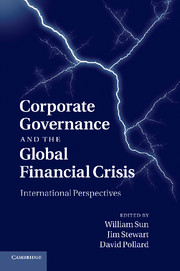Book contents
- Frontmatter
- Contents
- Figures
- Tables
- Contributors
- Acknowledgements
- 1 Introduction: rethinking corporate governance – lessons from the global financial crisis
- Part I The failure of the market approach to corporate governance
- Part II Ownership, internal control and risk management: the roles of institutional shareholders and boards
- 7 A review of corporate governance in UK banks and other financial industry entities: the role of institutional shareholders
- 8 Ownership structure and shareholder engagement: reflections on the role of institutional shareholders in the financial crisis
- 9 Board challenges 2009
- 10 Do independent boards effectively monitor management? Evidence from Japan during the financial crisis
- 11 Risk management in corporate law and corporate governance
- Part III Post-crisis corporate governance: the search for new directions
- Index
- References
8 - Ownership structure and shareholder engagement: reflections on the role of institutional shareholders in the financial crisis
Published online by Cambridge University Press: 05 August 2011
- Frontmatter
- Contents
- Figures
- Tables
- Contributors
- Acknowledgements
- 1 Introduction: rethinking corporate governance – lessons from the global financial crisis
- Part I The failure of the market approach to corporate governance
- Part II Ownership, internal control and risk management: the roles of institutional shareholders and boards
- 7 A review of corporate governance in UK banks and other financial industry entities: the role of institutional shareholders
- 8 Ownership structure and shareholder engagement: reflections on the role of institutional shareholders in the financial crisis
- 9 Board challenges 2009
- 10 Do independent boards effectively monitor management? Evidence from Japan during the financial crisis
- 11 Risk management in corporate law and corporate governance
- Part III Post-crisis corporate governance: the search for new directions
- Index
- References
Summary
The central role of shareholders in corporate governance is embodied in company law and corporate governance codes around the world. Company law in the UK, for example, states that a primary duty of directors is to run the firm in a way that promotes the success of the company for the benefit of its shareholders.
The quid pro quo for the shareholder primacy in corporate governance is an expectation that shareholders will carefully monitor the activities of the company, and potentially intervene if they have concerns about the performance or motivations of the board of directors. In most countries, the law provides them with voting and other shareholder rights to enable them to fulfil this role.
However, in the years leading up to the financial crisis, there appears to have been a widespread acquiescence by institutional investors – the dominant form of shareholder in many developed economies – in respect of rapidly rising levels of leverage at banks and other financial institutions.
- Type
- Chapter
- Information
- Corporate Governance and the Global Financial CrisisInternational Perspectives, pp. 144 - 164Publisher: Cambridge University PressPrint publication year: 2011
References
- 1
- Cited by



